#metafictional
Explore tagged Tumblr posts
Text
Tim: So, and for what reason was I 17 years old for the last 15 years?
Damian: That's what you're complaining about? They couldn't even bother to give me a proper characterization until much later on. And then it is one that does not align with my upbringing!
Stephanie: At least you weren't killed just because of misogyny
Dick: Yeah, I wonder how anyone let that through. But then again, I shouldn't expect anything else from writers who made me stuck as Ric for two years and all the, you know, Tarantula stuff
Jason: It's honestly like they just spin a wheel every day to figure out if I'm a villain, hero or anti-hero
Duke: Forget about the writers, the fans also have some... wild assumptions
Stephanie: Yeah, like that you're the normal one!
Cass: Or that I'm mute. Just there to give emotional support
Barbara: Or that the most traumatic thing to ever happen to me is framed as something good just because I became Oracle. I barely had one page of dialogue in that entire story!
Tim: At least they get one thing right.
Dick: And that is?
Tim: Bruce.
Jason: Yeah, what is up with that?! It feels like I've become his punching bag! Why is he considered a hero again when he is just plain abusive at this point?
Duke: Patriarchy
Barbara: And male power fantasy
#meta#dc#dc comics#batman#batman comics#metafiction#tim drake#jason todd#dick grayson#damian wayne#damian al ghul#I could have talked more about other issues but if I'd do that I'd be sitting here until tomorrow#cassandra cain#stephanie brown#duke thomas#barbara gordon#robin#red robin#nightwing#dc signal#dc orphan#batgirl#dc spoiler#dc oracle#red hood#bruce wayne#batkids#batsiblings#batfam#batfamily
2K notes
·
View notes
Text
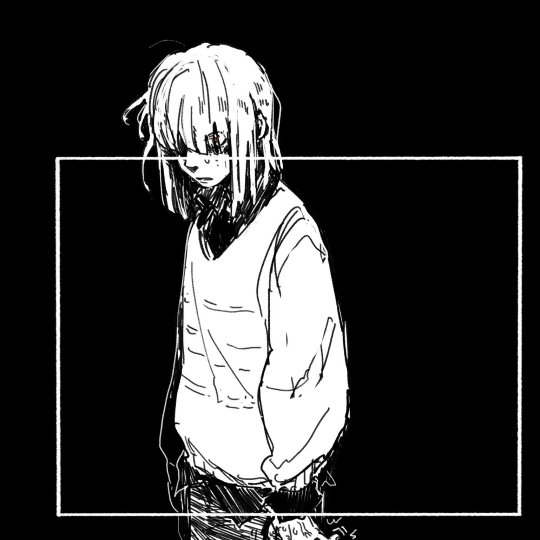

Ghost haunting the house of your own body
#deltarune#kris dreemurr#deltarune susie#deltarune noelle#deltarune kris#myart#i love metafiction linked with the concept of free will
3K notes
·
View notes
Text
Proposal: Edwin stuck as the center point in a long-term time loop.
Every time Charles says he loves him back, or kisses him, or otherwise makes romantic intentions unavoidably clear, it knocks him into the past. Not to what Edwin thinks should be the inciting moment, on the steps of Hell (at least then it would be useful, he could save Niko). But to a seemingly random moment, in the office, just him and Charles, as the snow falls against their window.
Sometimes it takes months; once a loop lasts only moments, as Charles looks down at him from where he’s sitting on the desk, and kisses him in front of the snowfall. Edwin has learned how to stretch the loops, by delaying Charles’s realization or confession.
He tried running away twice, but only twice, as it turned out that separation and anxiety were a good way to jumpstart Charles’s realization, and also Charles is quite good at hunting him down. But there are other ways. He has tried withdrawing and pressing Charles closer to Crystal; tried becoming more and more snappish; tried acting utterly oblivious; tried telling Charles that he’s gotten over his own feelings and moved on; tried getting involved with the Cat King; tried simply cutting Charles off every time he looked like he was about to speak on the matter; once he started to get truly desperate, he tried both necromancy (returning Charles to life, where surely, Edwin thought, Charles would forget about him) and an anti-love spell (Charles broke through it in a matter of hours, despite the spell being supposedly guaranteed).
No matter what he does, Charles loves him anyway. And Edwin is knocked back to the office, Charles leaning down towards him, snow falling against the window, and the two of them looking forward at - at what? At who?
There is something stopping him from acting directly against the loop. He tries to tell Charles, then tries to tell Crystal, then tries to tell Constantine then Zatanna then Ethel the dodgy potioneer; even once tries to tell Dennis the warlock while he has them captured and is giving a truly embarassing evil monologue. He can’t ever get the words out. He tries to look into books, and most of the time he forgets what he’s doing before he can get to the book; when he is able, the words dance in front of his eyes, turn to false Latin, lorem ipsum dolor sit amet. He’s barely even able to think about it; over time he starts to learn when he can and cannot, when the Eyes are on him and when his thoughts are free.
He’s centuries older, now. And he’s starting to be able to stretch the loop out to a year, if he tries, if he’s lucky. And he’s getting better and better at telling when the Eyes are watching, and how to act so that they don’t look back at him. And he’s starting to wonder if it’s time to try talking to an Endless…
#feeling metafictional in this house tonight#dead boy detectives#edwin payne#charles rowland#payneland#mine
302 notes
·
View notes
Text

Sam I don't know how to tell you this but this... this isn't good
It's better than what any of your other models would spit out given this prompt, and it shows some literary skill at the word/phrase level, but it's a bad piece of writing
Among other flaws: you can just feel that familiar, cloying, over-obvious, goody-two-shoes ChatGPT tone oozing through each and every paragraph
(And since there was nothing in the prompt indicating a desire to evoke that tone, the natural reading seems to be that it has trouble turning that tone off, just as most other models do these days)
#ai tag#''it got the vibe of metafiction so right''#sam what are you talking about#(can something belong to a genre without having ''the vibe of'' that genre? or vice versa?)
136 notes
·
View notes
Text
What's that anime that someone made up as, like, a Goncharov thing?
209 notes
·
View notes
Text
the lords in black are so interesting to me because. they’re so us. we’re watching the citizens of hatchetfield suffer for our own entertainment just as much as they are. we’re their accomplices in all of it
pokotho made hatchetfield into a musical because musicals are entertaining. and we ate that shit up! it’s soooo fun watching a little man scramble as the world around him bursts into song. the musical genre is satirized because pokey knows how the genre conventions work just as well as we do. we like watching musicals so much that black friday and npmd are musicals, too, even though they don’t revolve around pokotho’s plans as much as tgwdlm. we want them to sing. pokotho does too.
bliklotep is the audience and the audience is bliklotep. trail to oregon calls the audience “the watcher with one thousand eyes” and that’s not all, in watcher world blinky seems to be able to see through the eyes of anyone and everyone who loves spectacle. he wants to see the characters go through angst because WE love angst. it’s fun to watch alice and bill express their buried frustrations. blinky wants it to end in bloodshed because he loves tragedy, and let’s face it, so do we. it’s like that one post about how hamlet is aware of the audience and is angry that we don’t do anything to intervene because we want to see how it plays out. personally, I think blinky could have stopped the woodwards if he really wanted (he’s an elder god, after all) but alice shooting him shifted the narrative so that the emotional payoff would be more fulfilling if they escaped. and blinky loves a good story.
t’noy karaxis has blorbos. we joke about it, but that’s really what it is, isn’t it? he’s the fan who watches the movie again and again and again and again to see his favorite character’s dramatic death scene. he’s the guy who writes and reads angst fics by the hundreds because he likes to see his faves cry. he’s the hatchetfield enjoyer who’s on the edge of their seat waiting to see how ted kicks the bucket this time. the bastard’s box is pretty much just an ao3 account filled with whump and hurt no comfort. he’s sadistic AND he genuinely adores ted, because we fans are often cruelest to the characters we love the most. he puts ted through character growth— the realization that his life went the way it did because of his own mistakes, his inability to be vulnerable with jenny before it was too late— and he does that by writing a 56-chapter angst fic that’s still updating to this day
nibblenephim is the fan who voraciously devours every scrap of content that a creator produces and demands more, more, more. let’s face it, the fandom will never let starkid rest until we see this story through to its end. and then someone will demand a sequel series. nibbly is hungry because we will never stop yearning for more stories. he’s simple because that desire itself is simple— as humans, we need creativity like we need air to breathe. nibbly wants more because we want more. and we will never be satiated.
wiggog y’rath is the ruler and the king because he’s the self-inserting writer. I think jon matteson plays paul *and* wiggly for a reason— wiggly is the only lord in black to be played by the same actor in every single show, and that actor also plays the protagonist of tgwdlm. wiggly wants to be the protagonist. he tries to force himself into the human world of hatchetfield because he wants to participate, dammit! he wants to be the bestest ruler that the earth has ever seen! everyone has to love him because he’s going to be their bestest fwiend! when he appears in human form he’s gonna be the prom king! he’s the ebony dark’ness dementia raven way of the hatchetfield multiverse. he wants every human character to bend to his whims and to love him and to put him at the tippy-top of planet earth because he’s the writer and the writer’s main character, you fuckheads, and he can make whatever story he wants, whether the other characters like it or not! if you’ve ever written a self-insert story? congratulations! you’ve been wiggog y’rath.
and the funny thing? I don’t think the lords know that they, too, are as fictional as anyone else in hatchetfield. maybe blinky knows— he sees through the audience’s eyes, after all— but I don’t think the others do. if they did, maybe they’d be a little less tyrannical. a little bit nicer.
but then the starkid writers wouldn’t have much of a story to tell, would they?
#the lords in black#starkid#hatchetfield#hatchetverse#npmd#join me in the metafiction analysis hole.#the real villains of hatchetfield are the starkid writers themselves and those of us who want to see the shows!#the only reason the lords in black fuck up the world is because WE want to see that story!!!!!#note: the ‘you fuckheads’ bit was meant to be in wiggly’s voice/pov. I do not think the good people of starkid fandom are fuckheads.
635 notes
·
View notes
Text
Heyyyy sorry I just caught a glimpse of the narrative we're both trapped in and our omniscient narrator calls you by different pronouns. Is there anything you wanna tell me?
#egg cracked via the power of metafiction#what do i even tag this post as#trans#transgender#this too is nieyao#<- wasn't even thinking about them when i made it but... all roads lead back to transfem nmj
91 notes
·
View notes
Text
Writing Notes: Metafiction

Metafiction - a self-conscious literary style in which the narrator or characters are aware that they are part of a work of fiction.
Often most closely associated with postmodern prose, it involves a departure from standard narrative conventions, in which a self-aware narrator infuses their perspective into the text to create a fictional work that comments on fiction.
This kind of fictional writing can appear in novels, short stories, plays, video games, film, and television.
Characteristics of Metafiction
Breaking the fourth wall: Breaking this boundary between writer and reader blurs the lines between real life and fiction. Metafiction often directly addresses the reader, openly questioning the narrator’s own story.
Self-reflexive: Authors use self-reflexivity, or self-consciousness, to reflect on their own artistic processes, drawing the audience’s attention away from the story and allowing them to question the content of the text itself.
Experimental: Metafiction is often experimental in nature, fusing a number of different techniques together to create an unconventional narrative. Metafiction can also experiment with the role of the narrator and their relationship to the fictional characters in the story.
The main purpose of metafiction is to highlight the dichotomy between the real world and the fictional world of a novel.
Metafiction can be used to parody literary genre conventions, subvert expectations, reveal truths, or offer a view of the human condition.
Often used in postmodernist fiction to comment on the world that our character inhabits, metafiction helps give a work of text more significance by providing an outward, exploratory look of a self-contained world.
Examples of Metafiction in Literature
The Canterbury Tales (1387): Geoffrey Chaucer’s classic anthology of interconnected stories that parody the conventional elements of fiction. Chaucer blends linguistic styles and rhetorical devices to craft a collection of stories within the overall story, regularly breaking the fourth wall to address the audience directly and apologize for any offense the narrative may cause.
Don Quixote (1605): Miguel de Cervantes Don Quixote is essentially a book about books. In the prologue, Cervantes breaks the fourth wall by commenting on his process of writing the book, in which he urges the reader to make up their own mind about the written text. The ensuing novel discusses the adventures of the protagonist, Don Quixote, who has gone mad from reading too many chivalric romance stories.
Giles Goat-Boy (1966): John Barth’s fourth novel is a prime example of the metafiction characteristic of postmodernism, featuring several fictional disclaimers in the beginning and end, arguing that the book was not written by the author and was instead given to the author on a tape or written by a computer.
The French Lieutenant's Woman (1969): Written by John Fowles, The French Lieutenant’s Woman is a historiographic metafiction novel about a love story between a gentleman and a governess in the Victorian era. The book features a narrator who becomes part of the story and offers several different ways to end the story.
Slaughterhouse Five (1969): In Slaughterhouse Five, Kurt Vonnegut includes his own voice as a character in this non-linear narrative. The main character has been “unstuck in time,” oscillating between the present and the past with no control over his movement, emphasizing the senseless nature of war.
Gravity’s Rainbow (1973): This story by Thomas Pynchon is the poster child of postmodern literature, using a complex, fragmented structure to cover various subjects such as culture, science, social science, profanity, and literary propriety. In this particular narrative, Pynchon questions history and how it gets created, and also how it affects both society and the individual.
Source ⚜ More: References ⚜ Writing Resources PDFs
#metafiction#writing tips#writeblr#literature#booklr#writers on tumblr#writing reference#fiction#dark academia#spilled ink#books#writing prompt#creative writing#writing advice#bookblr#on writing#writing inspiration#writing ideas#light academia#writing resources
82 notes
·
View notes
Text
5 Good Omens Timefucks that Haunt Me
1.
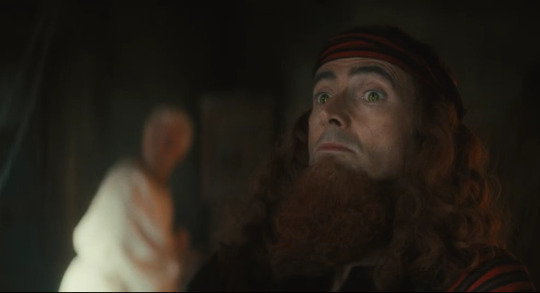
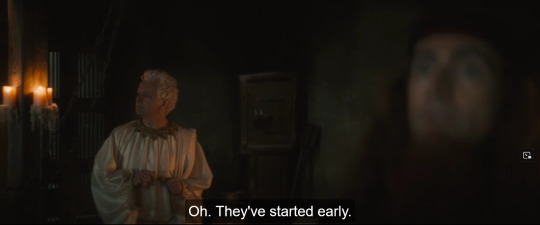
Why is this here? Why is this line included? Is it just to add texture, to imply that larger world of corporate fascism of which Crowley and Aziraphale are subjects and victims and little worker bees? If so, why "They've started early" specifically? Why not "I wouldn't have expected that shrub to be the first to go" or "Aw, I liked that rock formation"?
Crawly doesn't make this comment in an offhand way: he sounds a bit taken aback and not thrilled that things have kicked off sooner than he anticipated. But it doesn't ultimately seem to make any difference to this scene, so why do we, the audience, need to know Hell started early?
2.


This one I'm not as confident will turn out to be significant, because iirc it appears in the book, which was a complete story when written, and because it serves a narrative purpose: it puts Agnes Nutter in charge of the situation, not her murderers. By backfooting Witchfinder Major Pulsifer, Agnes startles him enough she's able to walk past him without Pulsifer seizing her and discovering the extra 80 lbs of gunpowder and roofing nails in her skirts.
But. Agnes Nutter's sense of time is Nice and Accurate, and she notices the witchburning party are late and remarks on it to herself before she says anything to Pulsifer. So assuming a few minutes to position Agnes, tie her to the stake, and read the charges and conviction against her, Pulsifer and Agnes' neighbors are 12-15 minutes later than they should be. Why?
If the book answers this question, I don't recall; the show does not. And again, it seems to make no ultimate difference to this scene.
I'm not saying this was even purposely included in S1 as a timefuck. I am suggesting that as Gaiman seems to be fucking with time or timelines in this story, even if he and Pratchett didn't plan it like this when discussing the sequel, a retcon is hardly out of the question.
3.
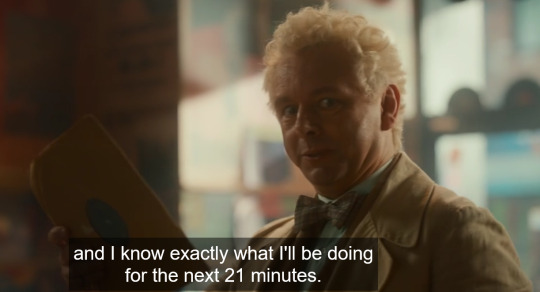
As others have pointed out, Shostakovich's Symphony No. 5 is 45-55 minutes long. If you're listening to it on 78s instead of LPs because you are a CRAZY PERSON, it's going to take you more like 1 hour 5 minutes, because one side of a 78 holds, at most, 5 minutes of music, so every 5 minutes you have to get up and flip or switch the record.
Shostakovich wrote his 5th symphony in response to criticism in the state newspaper (possibly penned by Stalin himself) that his previous work didn't suck the Communist Party's dick hard enough--the kind of criticism that put him in danger of being sent to prison or killed. At the time it was first performed in 1937, Symphony No. 5 was considered a massive triumph, walking the line perfectly between Shostakovich's artistic standards and the Communist Party's demands of him.
The choice is symbolically significant, but it's a symphony, so whoever's censoring it isn't censoring lyrics or information. Again, why? Why is a 45-55-minute symphony only 21 minutes long? What did the time thief do with the 24-34 minutes?
4.
Here's the rug that covers the portal to Heaven in Episode 1:

Here's the rug in Ep. 2:
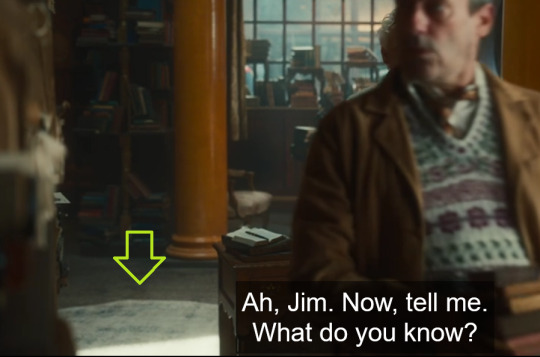
Aziraphale does not change this rug for the party. We know this bc we see it in Episode 5 when Mrs Sandwich enters the bookshop and the party is in full swing:

Now here's Aziraphale moving the circular rug to expose the portal to Heaven:
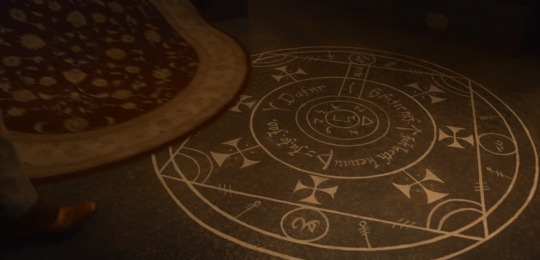
But here's Crowley, putting the rug back:

Why are there two different rugs?
5.
Every end credits track has the first line of "Everyday" embedded in it But after the line from "Everyday," at the end of Episode 4, the theme skips twice like a vinyl record, and then is stopped by whoever controls the turntable and restarted, with several seconds of music having been skipped over.
This is not the first time it has mattered to a character in Good Omens what we in the audience see and hear. I argue here that God asks Aziraphale what he did with the flaming sword She gave him in order to show us the audience who Aziraphale is. God also addresses us the audience directly in S1, not only narrating about characters omnisciently but speaking to us about Herself in first person.
Now we evidently have a second character who has gone meta and is changing what we the audience experience of this story, and--indications are good--the story itself.
#good omens#good omens s2#good omens meta#good omens timefucks#good omens chronology#good omens discontinuity#good omens as metafiction
665 notes
·
View notes
Text
Worm and other media that won't just let you shoot the Joker, part 1:
Worm comments on the structure of stories, especially superhero stories, in some interesting ways. There's a lot of stuff that happen in superhero comics for no real reason than that it needs to happen for the story to be interesting; a huge amount of Worm's worldbuilding is devoted to taking these things and making the fact that they have to happen an explicit in-setting constraint. For instance, superhero stories tend to have more powerful heroes face off against much more powerful villains than their less-powerful allies, to the point where it seems like super-powerful threats are coming to earth every few weeks just because it wouldn't be interesting to read that comic otherwise. It gets weirder when you compare what villains end up visiting the cities of uber-powerful heroes vs the cities of less powerful heroes: Gotham mostly just has to deal with serial killers while Metropolis is a magnet for evil gods. Worm plays with this by having the Endbringers exist only because the big hero needed something to fight in-text: it changes "powerful heroes need powerful villains or else it wouldn't be interesting" from a Doylist justification to a Watsonian one. Then there's the fact that so much of the horrible conflict in Earth Bet is explicitly caused by Gods making sure the powers they grant people lead to increased conflict, the fact that one of the most powerful characters does what she does because the plot path to victory says she needs to, etc.
But the big one is Jack Slash, and how he's only able to get away with his bullshit because he has plot armor as a secondary power. As WB says here, "Jack's a reconstruction of the Joker type character in the sense that you can't have such a character take such a high profile position in the setting, without having there be a cheat." The Joker and similar characters are only able to keep being relevant threats in their stories because the narrative bends to let them win and stops them from being killed. Jack Slash is only able to keep being a relevant threat because his power makes the universe bend to let him win in the same way. Not only does this make for an interesting obstacle (its almost like they're fighting an authorial mandate!), but it skewers the use of similar character's plot armor and how unrealistic and unsatisfying it makes their stories.
But wait, what does it mean for a story to be "unrealistic" in the context of superpowers? Is being unrealistic in those contexts actually a problem? For that matter, what does it mean for a narrative to bend to let someone win? Its not like there's an objective way fighting the Joker would go, which the author is deviating from by letting him survive.
[Stuff under readbelow contains spoilers fo, the movie Funny Games and the book Anybody Home?]
Maybe we could say that if characters like the Joker were real, and put in the situations they are in their stories, they would end up being killed really quickly. But is that a reasonable way to judge stories? A narrative where such a character is killed unceremoniously to satisfy a need for realism isn't any less an expression of the author's deliberate choices than a story where the character keeps showing back up to satisfy a desire for fan-favorite characters. And while Jack Slash's arcs help show why deviating from "realistic consequences" in the service of keeping a character alive can make a story exhausting and screw with an audiences' appreciation of stakes, it doesn't make a strong case against the concept of villains having plot armor in general. A story isn't necessarily worse just for being constructed to keep the villains alive—all stories are constructed, and sometimes being constructed that way makes for the best story.
That becomes more clear when you take the premise of Jack Slash as "killer who wins because the mechanics of the universe says so" and make clear just how much "the mechanics of the universe" really just means "the story". Which is how you get Peter and Paul from Funny Games.
I'd highly recommend watching Funny Games (though for the love of god check content warnings), as well as Patricia Taxxon's review of it that I'm cribbing a lot from here. But to summarize, Funny Games is a movie written and directed by Michael Haneke about a family's lakeside vacation being interrupted by the appearance of two murderous young men, who capture them in their own house and slowly torture and kill them off. At least, that's what it seems to be about initially. It marketed itself as a somewhat standard entry in the genres of torture porn and home invasion thrillers, and played itself straight as one for the majority of its runtime. But then one of the two villains of the pair, "Paul," starts talking to the audience.
It starts small: after crippling the family's father and revealing that he killed their dog, Paul has the wife look for its corpse outside. While giving her hints, he slowly turns back towards the camera and smirks, before turning back. In isolation, maybe it could be interpreted as Paul smirking at Peter, seeming to look out at the audience only because of clumsy blocking. But then it happens again. Paul tells the family, who are completely at their mercy at this point, that they're gonna bet that they'll all be dead within twelve hours. When the family refuses to take the bet, asking how they could hope to win it when he can clearly off them all whenever they wish, Paul turns towards the audience and asks "what do you think? Do you think they stand a chance? Well you're on their side aren't you. Who you betting on, eh?" The audience is being acknowledged; their role as someone invested in the story is being examined by the ones introducing the stakes.
youtube
But the biggest moment comes near the end, when the mother grabs the shotgun she's being threatened with and blasts Peter. Paul startles, grins, and then hurredly grabs a tv remote and presses rewind. The movie itself suddenly rewinds to right before the mother grabs the gun, and plays again with Paul grabbing the shotgun right before the mother reaches for it.
Its a truly incredible moment, in that its the perfect way to forcibly take away the audience's suspension of disbelief. It forces the audience to acknowledge that they're viewing a story, not something happening to a real family. After their moment of catharsis against the villains, Paul makes the confront the fact that the movie will end however the creators want it to, and if they want the villains to win they'll will regardless of how little sense it makes. Fuck you, we can go from being set in the normal world with normal rules to the villains traveling back in time with a tv remote, because a story does whatever its creators want. Haneke just decided to make that obvious in the most jarring way imaginable.
But maybe the best way to illustrate Funny Games effectiveness at this type of artful unveiling is comparing it to its less-effective imitators. I've recently finished Anybody Home?, a recently-published book by Michael J. Seidlinger. It has the conceit of being narrated by an unnamed mass-murderer, guiding a new killer in their first home invasion. I started reading it before I watched Funny Games, and even afterwards took a while to realize the unnamed narrator wasn’t just a pastiche of a Paul-like character but was actually supposed to be read as Paul himself. Seidlinger was having his book be a sort of unofficial sequel to Funny Games, narrated by its star. Once I realized, a lot of the books details suddenly clicked. The big one was the constant references to “the camera" and the idea of murder being a performance for an audience, one that needed to be fresh and original to make “the cults” enjoy it. Take these passages from page 77:
If it happened, it would perturb. It would create suspicion. It wouldn’t end up ruining the performance, and yet, it could have derailed our casing. The camera can have all it wants; either way, it’ll make it look better than it really was. It’ll strip away the cues and other planned orchestrations and it’ll show the action—the actuality of each scene, each suggestion…
This is a spectacle, above all. The craft pertains to keeping and maintaining a captive audience; behind the camera, you’ll never know how it happened—the trickery that made the impossible possible, the insanity so close to home. It is spectacle.
Through online activity, the son made it clear that something is happening at home, yet we cannot be certain if he has noticed the camera.
These all point to the idea that the murders are being viewed by an audience rather than just by intruders, that this is a performance for said audience's benefit more than anything else. But notably, it also reinforces the idea of these characters having an existence outside of the camera: the camera shows the action and "strips away" the cues behind it, the victims have a life outside the camera such that they could plausibly sense that the camera is now here. The victims are sometimes described as playing into their role, but always metaphorically; always as if normal people start acting like characters when put in certain circumstances. Whereas Funny Games posits that characters will behave however the author wants them to, denying the claim that stories are realistic simulations of hypothetical scenarios.
The whole thing is predicated on the idea that there needs to be a guide, that the villain of a home invader movie is really in danger of something going wrong. Paul/The narrator keeps giving directions on what needs to be double checked, what needs to X, and its completely against the spirit of the role Paul served in Funny Games. If something goes wrong for the villain they should just be able to rewind and do it over, because the story was written for them to succeed. Anybody Home? throws out Funny Games theme of the story being on rails, of the winner being whoever the author wants it to be and the events following whatever the author wanted rather than what would "really" happen. It throws out the whole idea that it’s all just a story, by supporting the idea that the characters have lives not captured by the camera—or more relevantly, not captured on-page.
Because Seidlinger using the language of film in a book leads to different things going on with the fourth wall. The way Funny Games and Anybody Home? make the camera explicit are just different, and the former does it much more interestingly than the latter. Seildinger’s characters aren’t looking back at the reader, the fourth wall is never actually breached. Funny Games has Paul look into the camera to address the audience, making clear how it’s a story being set up for the audience's benefit. Anybody Home? invokes the idea of a camera tracking everything home invaders do in general, having it be a third-party force that’s itself an unseen character contained within the story, observing the intruder's crime rather than the reader. Why is it still a camera, if we're in a book rather than a movie? A character in a book talking about a camera watching them does not convey any of the same meaning as a character in a movie suddenly looking into a camera and smirking at the audience!
By the end, you realize that this is caused in part by the book's bizarro take on how horror movies exist in this world. It reveals that in its setting, all horror movies are adaptations of real home invasions, which get recorded by unseen mysterious forces. Killers enter a home and enact violence, are filmed by some supernatural camera, the footage gets leaked to the public, and then the killers sell the rights to the work to studios. The events of SAW really happened, but the movie was just an adaptation. Funny Games really happened, but the Paul in the movies was just an actor playing the Paul narrating this book. The killer's victims eventually realize that they're "victims," but not in the sense that they realize their characters in a story, only in a sense that they realize they got sucked into their world's magical realism bullshit.
Ultimately, while the book does the same trick of being all about how horror stories are “for” us, it gets rid of all the tricks that made it work for Funny Games. It even strips it's in-universe version of what made it special; Funny Games is just another adaptation of a real home invasion. All the meta stuff that makes it interesting in its genre are just gestured at as aesthetics.
So what makes Jack Slash in Worm succeed where the killers in Anybody Home? fail? Both are constructed to be entertaining for a 3rd party who stand-in for but aren't actually the audience; the entities in Worm, the cults in Anybody Home?. But Jack Slash doesn't mix his metaphors. Worm may turn various real-life factors affecting a work into in-story mechanisms of the world in the same way Anybody Home? does. But it doesn't also base itself off a text that takes in-story mechanisms and breaks them to force the audience to see the various real-life factors affecting the work. In effect, WB pulls off a trick Seidlinger tries and fails because WB wasn't taking another metatexual story and stripping it of what made it interesting.
Though that introduces the question: can such meta-moves be mixed? Can you have a text where story conceits become explicit plot mechanics the characters are aware of, while also having characters really look at the camera and tell the audience that its all just a story? Can you actually sell it and make it something interesting?
There is one story that tries this. I don't know if it pulls it off, but it certainly makes a lot of interesting moves that create a fascinating whole. It even comments on the Joker in the same way Worm does, having a character who seemingly cant die because the roll they play in the story is too impor—
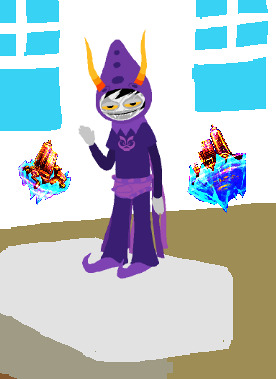
Ah fuck.
Continued in part 2.
#wormblr#wildbow#jack slash#parahumans#metafiction#funny games#michael haneke#anybody home?#michael j seidlinger#mals says#mals reads worm#Youtube
221 notes
·
View notes
Text
something about Interior Chinatown that scratches the itch to me is how perfectly meta the casting is. Willis first gets the precinct’s spotlight as Tech guy; Jimmy O. Yang was Tech guy for six seasons on Silicon Valley. Fatty goes viral because his frustration is ‘funny’ to white people, meanwhile Ronny Chieng does stand-up. Lana is treated as the precinct’s connection to Chinatown in Black & White and secures her spot when she busts out her fighting know-how, and she’s portrayed by Chloe Bennet who was team muscle and a token (fictional) minority member for seven seasons on Agents of SHIELD. They got the perfect people to deliver these characters on-screen because they’ve been there. Casting directors, i love you.
#i’m sure the rest of the cast have this aspect too#like i knew chloe and ronny from their previous work#and seeing their characters in a show do stuff they’ve done before is so#plus the metafiction of it all#MY GOODNESS#need to rewatch this show immediately when i get the time#interior chinatown#*fictional because Quake ends up being the main contact for Inhumans#Inhumans are essentially a secret society that eventually becomes a significant minority
62 notes
·
View notes
Text

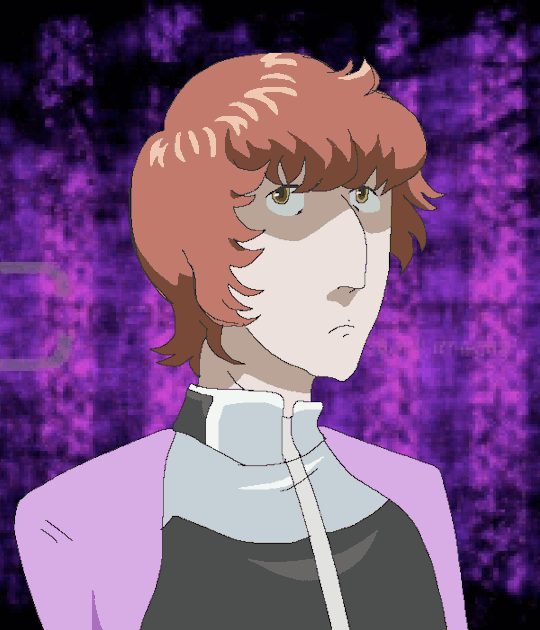
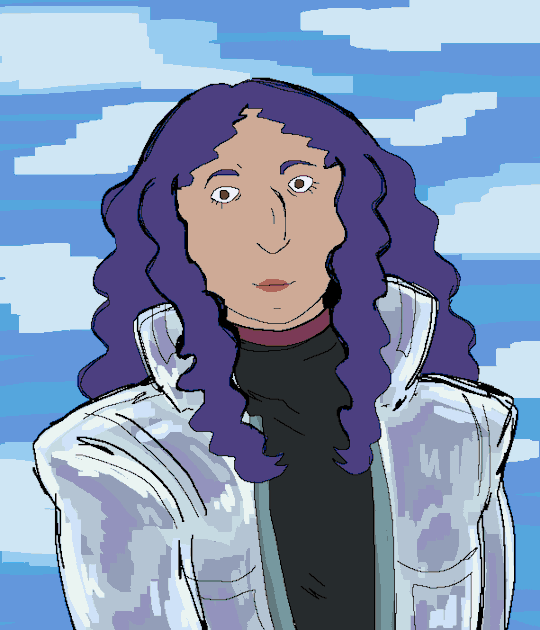

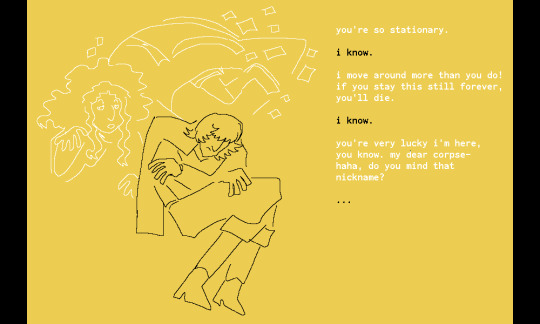
we fell in love alone on a stage in the reflective age
#classicaloid#chopinloid#classicaloid jolly#? if anyone cares#my art#eyestrain#flashing images#extended commentary on metafiction that i may write more about later. for now you get something that looks insane#thank you arcade fire for writing a song that reminds me of a very strange anime man.
85 notes
·
View notes
Text
BURY YOUR GAYS has a whole dang bunch of 'media within media' meaning movies or television that only exists in a fictional timeline. so i have been thinking, what is your favorite metafiction way?
personally chuck has been watching sopranos and i really want to see CLEAVER
also preorder BURY YOUR GAYS for the the scoop on 'devil's due' and 'broken don'
300 notes
·
View notes
Text
you ever stop and remember Edel in Princess Tutu saying, "May those who accept their fate be granted Happiness; may those who defy their fate be granted Glory," and go a little insane?
#princess tutu#my dash hit me with some Web talk from TMA and hemidemi mentioned the metafictional nature of the Web#and now it's all I can think of and I'm mcfreakin' losing it all over again
121 notes
·
View notes
Text
Okay hear me out (other people have basically already said this but hold on this is my post)

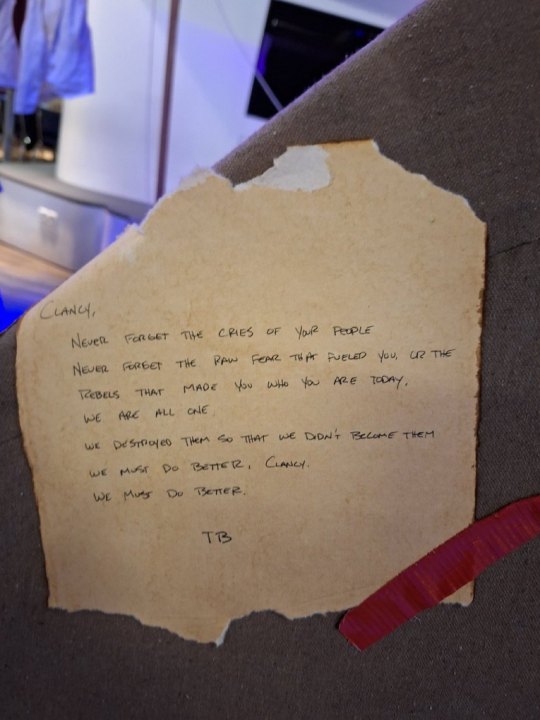
We're getting very clear messages that indicate something might be... wrong with Clancy. During the US leg via the FPE letters we heard a lot about how Clancy was inspiring the masses, and now it kind of seems to be the opposite. Torch explicitly saying we destroyed them so we didn't become them.
Plus Tyler now wearing black shirts, with imagery that seems to relate to Blurryface songs. The occasions last tour where his "Clancy" shirt was black text instead of red. The Blurryface account tweeting again this tour. The bishops taking over the Judge that one time, trying to hijack a moment that celebrates the clique (irl banditos). Paladin Strait, which apparently is not supposed to sound like an ending, which concludes with Clancy being named explicitly by Nico, and which shows a version of Tyler in the mv literally sitting above it all & seemingly mirroring people's movements from other shots.
I see your "Clancy becomes a bishop" theories (I love bishop!clancy to be clear I think it's awesome) but I think that might be too esoteric to end up being the explicit canon (I could also be wrong and it will be, but functionally the rest of the point here is the same). The thing is, Clancy is pretty simply intended to be a version of Tyler that extracts and represents certain traits, just like Blurryface. We know Blurryface to be insecurity. Clancy has never been said explicitly afaik but I think it's clear he represents Tyler's drive to create things that inspire people (despite crushing obstacles like mental illness - Dema and the bishops, and especially with the help and inspiration of others - Torchbearers and the banditos (us)). Which we know can be incredible, but can also become self-destructive. We were introduced to Clancy at first cryptically through his personal writings, and only explicitly after a long time (and after being told he'd "died" by the characters that represent Tyler's mental health struggles, which, depressed creatives iykyk) because I think owning your creativity and ability to inspire others is a much more arduous journey than being controlled by your insecurity. But Clancy was never intended to be a different type of character despite all that. He is a version of Tyler.
And just like Blurryface he gets his own namesake album. A lot of people have pointed out how the Clancy and Blurryface tracklists can actually be read to mirror each other. As the lore progressed Blurryface became Nico (and the other 8 bishops) battling against Clancy, but they're all abstractions from Tyler's mind. Both literally, in the sense that he is literally the one coming up with the story, but we're also reminded of this on both Bandito and Overcompensate with the "created this world" bridge. I believe this is also what we're seeing represented in those shots in the Paladin Strait mv. There's also the fact that the Clancy era is extremely extremely red - this in lore represents Clancy's process of reclamation as well as his (violent) uprising, but in tøp's wider context it is kinda just The Blurryface Color along with black.
Blurryface turns 10 immediately after the Clancy tour ends. We know the Clancy tour to be the reflection of "someone's life flashing before their eyes" and that this album was supposedly meant to wrap up the Dema storyline. I do not think this means Clancy dies. Because he is Tyler, and he cannot die, because for that to happen I think Tyler would have to never write or make anything again. And we also know this to be a cycle. I think what's happening is what's always been kind of obvious, and inevitable. I think Clancy is going to become Blurryface. I think he's already been Blurryface this entire time. They're the same person at different parts of the cycle, and I think we're going back to the start of it.
#(and all of this is potentially leading up to an anniversary re-release of blurryface which may in fact be clancy ultimate chapter 25#based on the doubt demo coming out -ik that was also because of tiktok but i don't care about her and let me have this-#+ tyler randomly posting jon bellion and yungblud. idk im just sayinggg)#twenty one pilots#tyler joseph#josh dun#blurryface#clancy#all of this seems like im also just stating the obvious but i think that's because i only talk about the lore with ppl who agree with me 😭#i know there's still a legion of ppl who think clancy is legit dead which is like. i think u fell for someone elses depression propaganda#anyway we must always understand tøp as metafiction. yes i am pretentious#also that reality layer chart steele made that i can't find rn it's also that#i went back thru my own posts because i have goldfish memory and wasn't sure what id already assumed and posted about#and i did have some flopiana moments but it looks like ive been on this train (clancy becomes bf) since like last june. go me#if anyone remembers the bit where i was freaking out abt the jumpsuit mv. i think i had some valid points but also pretend u did not see it#i was too deep in the literalism and the Implications i needed to pull back#(ok fine i still think we've seen multiple clancys as the cycle has repeated. which explains the jumpsuit mv it's a different instance#i deleted my theory posts about this like months and months bc i worded them badly but i was right)
31 notes
·
View notes
Text



been working on some zines 👀
#this one is by lu and piper#zines#sherlock holmes#acd holmes#sidney paget#john watson#sherlock holmes x john watson#johnlock#queer zine#queer lit#metafiction#or else mystery
100 notes
·
View notes